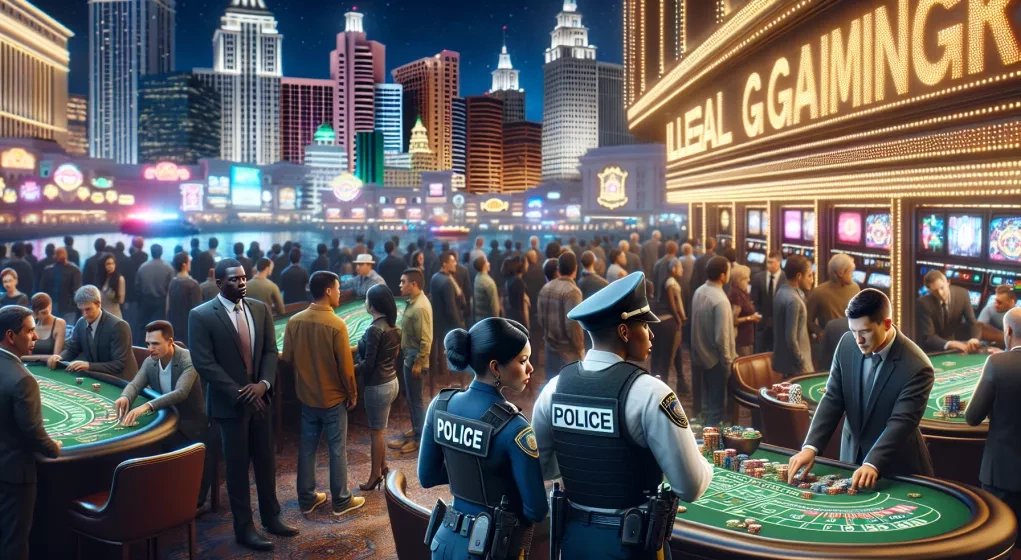In the shadowed corners and vibrant halls of Macau’s opulent casinos, a new reckoning is on the horizon — one that wields the sword of justice with a firmer grip. The Macau government, under the vigilant eyes of legislators poised for reform, has raised the banner against the scourge of gambling-related crime, invoking the power of law to purge the city of its illicit underbelly.
At the forefront of this legislative crusade is the aptly named, “Law to Combat Illegal Gambling Crimes”, a robust measure seeking to reinforce the legal ramparts with sturdier barricades. The statute bears the mission of revitalizing outdated gaming laws, breathing new life into the precepts of Law No.8/96/M, which has long stood as the guardian against the chaos of illegal gambling.
Within the proposed bill lies a draconic approach to lending’s dark side — the cloak-and-dagger deals that lurk behind the glittering facades. Perpetrators who dare to offer illegal loans within the sanctum of the city’s casinos would now face the dire consequence of up to five years behind bars. Those who fall prey to such temptation, embracing borrowed money to gamble, would stand equally condemned.
What’s more, the unforgiving hand of justice would grip tighter still in cases where the loaner’s transgressions escalate, elevating the retribution to a chilling eight years of incarceration. Such severity reflects the heartfelt declaration of Coco Leong Weng, the esteemed director of Macau’s Legal Affairs Bureau, who has boldly advocated for the elevation of prison terms – a stark climb from the modesty of three years to the weight of nearly a decade.
This legislative storm gathers at a time when Macau, that pearl within the Chinese ambit, is called to cleanse itself of those who seek fortune through the flagrant defiance of its gaming decrees. The edict from Beijing is clear — scour the landscape, for the heft of currency flowing unchecked through these casinos poses a shadow upon national security. In Xi Jinping’s eyes, the president himself, it is a battle of both economic and existential dimensions.
Onward the bill marches, extending its purview to the nebulous realm of cyberspace. Ensnared in its web would be those who cast their digital nets within Macau, gambling through the untethered channels of the internet. The penalty? A sobering enclosure of up to half a year in the steely confines of a cell, complemented by the monetary sting of a potential MOP10,000 fine. The sight is set squarely on the proxy bettors, those shadowy figures who extend the hands of absent gamblers into the tactile world of the casino floor.
Further complexities arise with the specter of nonresidents, found in violation of the bill’s edicts, who would face an exile spanning five to ten years. It is a measure woven to streamline the court process and cut through the quagmire of legal discourse encircling Macau’s gaming sphere.
And what of the everyday citizen, engaging in the traditional dance of mahjong with the spice of stakes added to the mix? Under the watchful gaze of this bill, even such casual gamblers are not immune. Fines grasp at a spectrum, dangling from $37 to $620, calibrated to the gravity of the bet and the shadow of past misdeeds.
As the night cloaks Macau in its enigmatic shroud, the bill empowers law enforcement to pierce the veil of suspicion, sanctioning searches from dusk until dawn, targeting establishments and private dwellings alike. It is within these veiled hours, the bill contends, that illegal gambling sows its chaotic seeds.
Yet within the darkened weave of potential prosecution, threads of hope shimmer for those who choose cooperation. The statute carves a sanctuary of immunity for those who stand with law enforcement, guiding their steps toward the concealed nests of illegal gambling and the vipers that nest within.
In the labyrinth of vice and virtuosity that is Macau, the “Law to Combat Illegal Gambling Crimes” emerges as a manifesto of order — an unwavering declaration that in the relentless pursuit of justice, the house always wins.






